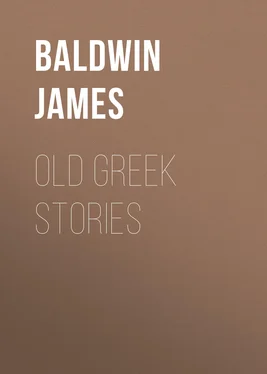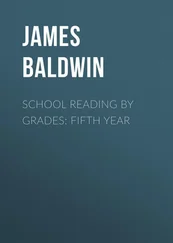James Baldwin - Old Greek Stories
Здесь есть возможность читать онлайн «James Baldwin - Old Greek Stories» — ознакомительный отрывок электронной книги совершенно бесплатно, а после прочтения отрывка купить полную версию. В некоторых случаях можно слушать аудио, скачать через торрент в формате fb2 и присутствует краткое содержание. Жанр: foreign_children, Мифы. Легенды. Эпос, foreign_antique, foreign_prose, на английском языке. Описание произведения, (предисловие) а так же отзывы посетителей доступны на портале библиотеки ЛибКат.
- Название:Old Greek Stories
- Автор:
- Жанр:
- Год:неизвестен
- ISBN:нет данных
- Рейтинг книги:4 / 5. Голосов: 1
-
Избранное:Добавить в избранное
- Отзывы:
-
Ваша оценка:
- 80
- 1
- 2
- 3
- 4
- 5
Old Greek Stories: краткое содержание, описание и аннотация
Предлагаем к чтению аннотацию, описание, краткое содержание или предисловие (зависит от того, что написал сам автор книги «Old Greek Stories»). Если вы не нашли необходимую информацию о книге — напишите в комментариях, мы постараемся отыскать её.
Old Greek Stories — читать онлайн ознакомительный отрывок
Ниже представлен текст книги, разбитый по страницам. Система сохранения места последней прочитанной страницы, позволяет с удобством читать онлайн бесплатно книгу «Old Greek Stories», без необходимости каждый раз заново искать на чём Вы остановились. Поставьте закладку, и сможете в любой момент перейти на страницу, на которой закончили чтение.
Интервал:
Закладка:
This is the question which some one asked Jupiter as he sat in his golden hall. Of course the mighty ruler of earth and sky was too wise to be puzzled by so simple a thing, but he was too busy to answer it at once. So he said:
"Come again in one year from to-day, and I will show you the very place."
Then Jupiter took two swift eagles which could fly faster than the storm-wind, and trained them till the speed of the one was the same as that of the other. At the end of the year he said to his servants:
"Take this eagle to the eastern rim of the earth, where the sun rises out of the sea; and carry his fellow to the far west, where the ocean is lost in darkness and nothing lies beyond. Then, when I give you the sign, loosen both at the same moment."
The servants did as they were bidden, and carried the eagles to the outermost edges of the world. Then Jupiter clapped his hands. The lightning flashed, the thunder rolled, and the two swift birds were set free. One of them flew straight back towards the west, the other flew straight back towards the east; and no arrow ever sped faster from the bow than did these two birds from the hands of those who had held them.
On and on they went like shooting stars rushing to meet each other; and Jupiter and all his mighty company sat amid the clouds and watched their flight. Nearer and nearer they came, but they swerved not to the right nor to the left. Nearer and nearer-and then with a crash like the meeting of two ships at sea, the eagles came together in mid-air and fell dead to the ground.
"Who asked where is the center of the world?" said Jupiter. "The spot where the two eagles lie-that is the center of the world."
They had fallen on the top of a mountain in Greece which men have ever since called Parnassus.
"If that is the center of the world," said young Apollo, "then I will make my home there, and I will build a house in that place, so that my light may be seen in all lands."
So Apollo went down to Parnassus, and looked about for a spot in which to lay the foundations of his house. The mountain itself was savage and wild, and the valley below it was lonely and dark. The few people who lived there kept themselves hidden among the rocks as if in dread of some great danger. They told Apollo that near the foot of the mountain where the steep cliff seemed to be split in two there lived a huge serpent called the Python. This serpent often seized sheep and cattle, and sometimes even men and women and children, and carried them up to his dreadful den and devoured them.
"Can no one kill this beast?" said Apollo.
And they said, "No one; and we and our children and our flocks shall all be slain by him."
Then Apollo with his silver bow in his hands went up towards the place where the Python lay. The monster had worn great paths through the grass and among the rocks, and his lair was not hard to find. When he caught sight of Apollo, he uncoiled himself, and came out to meet him. The bright prince saw the creature's glaring eyes and blood-red mouth, and heard the rush of his scaly body over the stones. He fitted an arrow to his bow, and stood still. The Python saw that his foe was no common man, and turned to flee. Then the arrow sped from the bow-and the monster was dead.
"Here I will build my house," said Apollo.
Close to the foot of the steep cliff, and beneath the spot where Jupiter's eagles had fallen, he laid the foundations; and soon where had been the lair of the Python, the white walls of Apollo's temple arose among the rocks. Then the poor people of the land came and built their houses near by; and Apollo lived among them many years, and taught them to be gentle and wise, and showed them how to be happy. The mountain was no longer savage and wild, but was a place of music and song; the valley was no longer dark and lonely, but was filled with beauty and light.
"What shall we call our city?" the people asked.
"Call it Delphi, or the Dolphin," said Apollo; "for it was a dolphin that carried my mother across the sea."
In the Vale of Tempe, which lies far north of Delphi, there lived a young girl whose name was Daphne. She was a strange child, wild and shy as a fawn, and as fleet of foot as the deer that feed on the plains. But she was as fair and good as a day in June, and none could know her but to love her.
Daphne spent the most of her time in the fields and woods, with the birds and blossoms and trees; and she liked best of all to wander along the banks of the River Peneus, and listen to the ripple of the water as it flowed among the reeds or over the shining pebbles. Very often she would sing and talk to the river as if it were a living thing, and could hear her; and she fancied that it understood what she said, and that it whispered many a wonderful secret to her in return. The good people who knew her best said:
"She is the child of the river."
"Yes, dear river," she said, "let me be your child."
The river smiled and answered her in a way which she alone could understand; and always, after that, she called it "Father Peneus."
One day when the sun shone warm, and the air was filled with the perfume of flowers, Daphne wandered farther away from the river than she had ever gone before. She passed through a shady wood and climbed a hill, from the top of which she could see Father Peneus lying white and clear and smiling in the valley below. Beyond her were other hills, and then the green slopes and wooded top of great Mount Ossa. Ah, if she could only climb to the summit of Ossa, she might have a view of the sea, and of other mountains close by, and of the twin peaks of Mount Parnassus, far, far to the south!
"Good-by, Father Peneus," she said. "I am going to climb the mountain; but I will come back soon."
The river smiled, and Daphne ran onward, climbing one hill after another, and wondering why the great mountain seemed still so far away. By and by she came to the foot of a wooded slope where there was a pretty waterfall and the ground was bespangled with thousands of beautiful flowers; and she sat down there a moment to rest. Then from the grove on the hilltop above her, came the sound of the loveliest music she had ever heard. She stood up and listened. Some one was playing on a lyre, and some one was singing. She was frightened; and still the music was so charming that she could not run away.
Then, all at once, the sound ceased, and a young man, tall and fair and with a face as bright as the morning sun, came down the hillside towards her.
"Daphne!" he said; but she did not stop to hear. She turned and fled like a frightened deer, back towards the Vale of Tempe.
"Daphne!" cried the young man. She did not know that it was Apollo, the Lord of the Silver Bow; she only knew that the stranger was following her, and she ran as fast as her fleet feet could carry her. No young man had ever spoken to her before, and the sound of his voice filled her heart with fear.
Конец ознакомительного фрагмента.
Текст предоставлен ООО «ЛитРес».
Прочитайте эту книгу целиком, купив полную легальную версию на ЛитРес.
Безопасно оплатить книгу можно банковской картой Visa, MasterCard, Maestro, со счета мобильного телефона, с платежного терминала, в салоне МТС или Связной, через PayPal, WebMoney, Яндекс.Деньги, QIWI Кошелек, бонусными картами или другим удобным Вам способом.
Интервал:
Закладка:
Похожие книги на «Old Greek Stories»
Представляем Вашему вниманию похожие книги на «Old Greek Stories» списком для выбора. Мы отобрали схожую по названию и смыслу литературу в надежде предоставить читателям больше вариантов отыскать новые, интересные, ещё непрочитанные произведения.
Обсуждение, отзывы о книге «Old Greek Stories» и просто собственные мнения читателей. Оставьте ваши комментарии, напишите, что Вы думаете о произведении, его смысле или главных героях. Укажите что конкретно понравилось, а что нет, и почему Вы так считаете.












